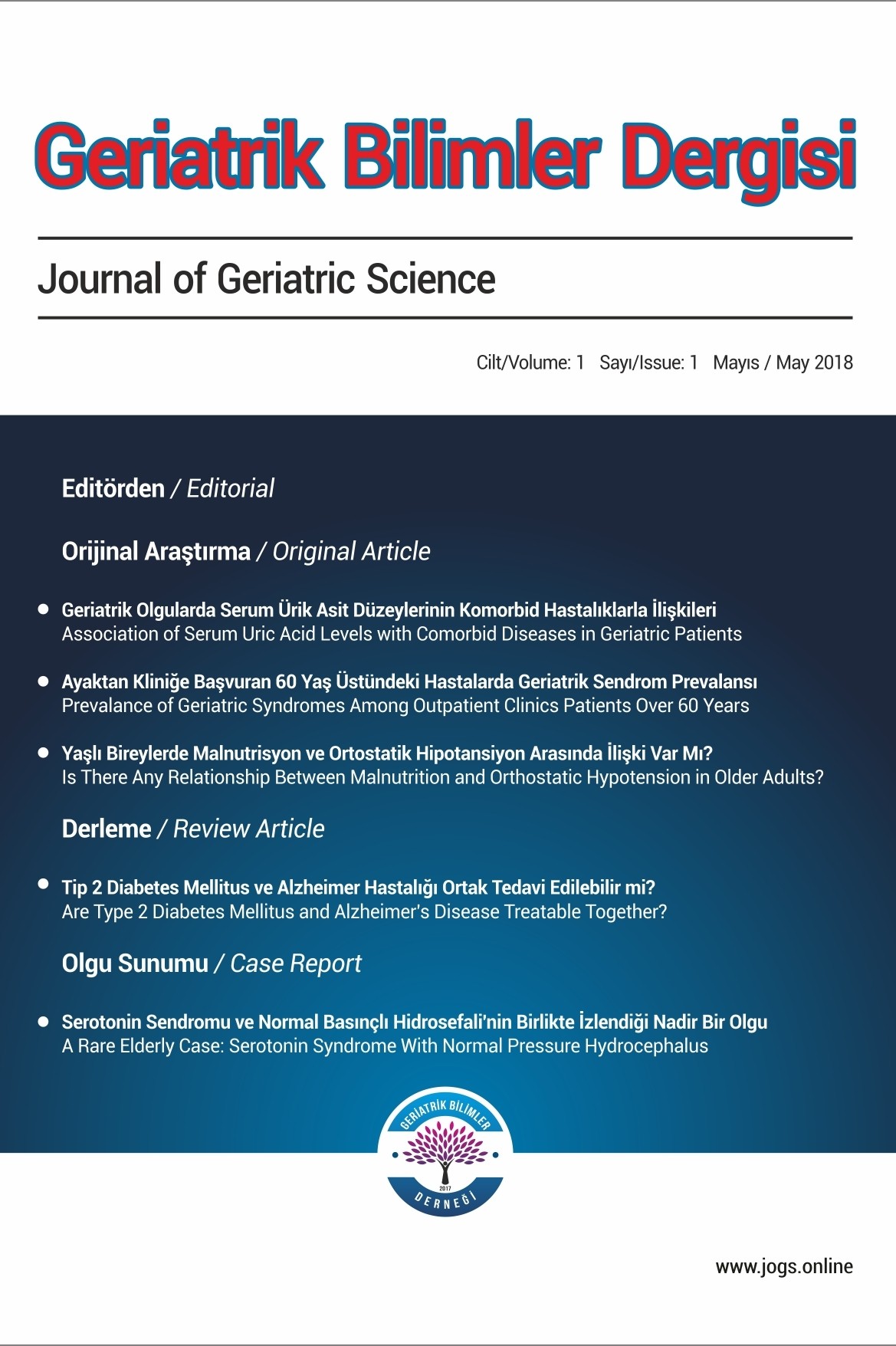Yaşlı COVID-19 Hastalarında Tedavinin Güçlükleri ve Potansiyel İlaç Etkileşimleri
yaşlı, COVID-19, İlaç etkileşimleri, hidroksiklorokin, polifarmasi
The Challenges of COVID-19 Treatment in Older Patients and Potential Drug Interactions
COVID-19, drug interactions, hydroxychloroquine, older adults, polypharmacy,
___
- 1. Chan KW, Wong VT, Tang SCW. COVID-19: An Update on the Epidemiological, Clinical, Preventive and Therapeutic Evidence and Guidelines of Integrative Chinese-Western Medicine for the Management of 2019 Novel Coronavirus Disease. The American journal of Chinese medicine. 2020 Mar; 13:1-26.
- 2. Ates Bulut E, Soysal P, Isik AT. Frequency and coincidence of geriatric syndromes according to age groups: a single-center experience in Turkey between 2013 and 2017. Clinical interventions in aging. 2018; 13:1899-1905.
- 3. Sanders JM, Monogue ML, Jodlowski TZ, et al. Pharmacologic Treatments for Coronavirus Disease 2019 (COVID-19): A Review. JAMA. 2020 May; 323(18):1824-1836.
- 4. Taccone FS, Gorham J, Vincent JL. Hydroxychloroquine in the management of critically ill patients with COVID-19: the need for an evidence base. Lancet Respir Med. 2020 Jun ;8(6):539-541.
- 5. Geleris J, Sun Y, Platt J, et al. Observational Study of Hydroxychloroquine in Hospitalized Patients with Covid-19. N Engl J Med. 2020 Jun; 382(25):2411-2418.
- 6. Dixon DL, Van Tassell BW, Vecchie A, et al. Cardiovascular Considerations in Treating Patients With Coronavirus Disease 2019 (COVID-19). Journal of cardiovascular pharmacology. 2020 May;75(5):359-367.
- 7. https://www.covid19-druginteractions.org/. Accessed in 6th July 2020.
- 8. Lexicomp® Drug Interactions. https://www.uptodate.com/drug-interactions/#di-druglist. Accessed in 7th July 2020.
- 9. COVID-19 Treatment Guidelines Panel. Coronavirus Disease 2019 (COVID-19) Treatment Guidelines. National Institutes of Health. Available at https://www.covid19treatmentguidelines.nih.gov/. Accessed in 6th July 2020.
- 10. U.S. Food & Drug Administration News Release: Coronavirus (COVID-19) Update: FDA Revokes Emergency Use Authorization for Chloroquine and Hydroxychloroquine. Available at https://www.fda.gov/news-events/press-announcements/coronavirus-covid-19-update-fda-revokes-emergency-use-authorization-chloroquine-and. Accessed in 18th June 2020.
- Yayın Aralığı: Yılda 3 Sayı
- Başlangıç: 2018
- Yayıncı: Geriatrik Bilimler Derneği
Yaşlı COVID-19 Hastalarında Tedavinin Güçlükleri ve Potansiyel İlaç Etkileşimleri
Esra ATEŞ BULUT, Pinar SOYSAL, Ahmet Turan IŞIK
Yaşlılarda Depresyon Düşme Sıklığı ile İlişkilendirilebilir mi?
Feyza MUTLAY, Neziha ULUSOYLAR ERKEN, Fatma Sena DOST GÜNAY, Derya KAYA, Ahmet Turan IŞIK
COVID-19 Pandemisine Yönelik Gerontolojik Müdahale Önerileri
Sosyal Belediyecilik Bağlamında Yaşlı Bakım ve Alzheimer Gündüz Yaşam Merkezleri
Muhammed ŞENER, Hasan Hüseyin TEKİN
Geriatrik Erkeklerde Nokturi ve Ayrıntılı Geriatrik Değerlendirme Parametreleri
Pinar SOYSAL, Lee SMITH, Ekrem DUTOGLU, Igor GRABOVAC, Nicola VERONESE, Ahmet Turan IŞIK
Sağlık Çalışanlarının Yaşlı İstismarı Konusundaki Algısı ve Farkındalığının Araştırılması
Hipomagnezeminin Geriatrik Sendromlar ve Mortalite ile Birlikteliği
Yaşlılık İnancı ve Yaşlılık İnancını Etkileyen Etmenlerin İncelenmesi
Şenay ÖZTÜRK, Yalçin KANBAY, Meryem FIRAT, Aysun AKÇAM, Burcu DEMİR
